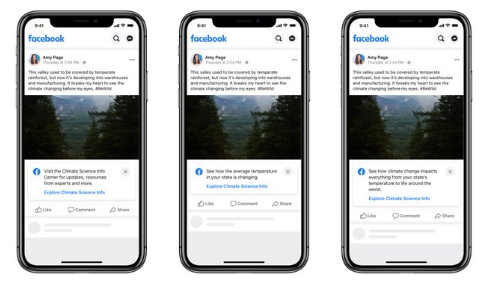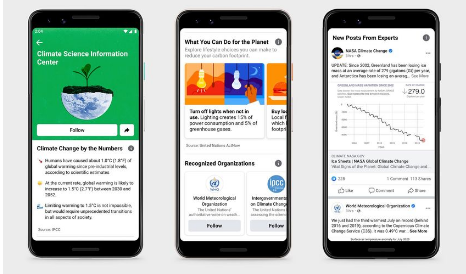Facebook Expands Climate Science Information Center, Besides Adding New Information Prompts on Posts
Facebook has just announced an expansion of its Climate Science Information Center, not only that but also, a new test of alert prompts on posts about climate change, which aim to better educate users about the impacts, and subsequent the need for action.
First off, on the new prompts, which could end up having the most impact. Moreover, starting in the UK, Facebook is launching a test that will see the addition of informational labels on selected posts about climate change.
Facebook’s Climate Information Science Center:

In the above examples, the new prompts, triggered by either word within the user post or the text of the article being shared, will direct users to credible climate information in Facebook’s Climate Science Information Center, ideally helping to lessen the spread of false information about climate impacts.
Additionally, the alerts are similar to the warnings Facebook recently used for election misinformation, which directed users to its Voting Information Center.

Talking more about Facebook’s Climate Information Science Center, the process here is essentially the same, collecting expert information into a dedicated space, then re-directing users back to it, in order to improve awareness as well as understanding.
This further relates to the expansion of Facebook’s Climate Science Information Center: “The center is already available in France, Germany, the UK, and the US, and from today, our center will also be available in Belgium, Brazil, Canada, India, Indonesia, Ireland, Mexico, the Netherlands, Nigeria, Spain, South Africa, and Taiwan.”

The first time Facebook’s Climate Science Infromation Center was launched, back in September, collecting expert insights besides information in order to help dispel common misunderstandings and misgivings about climate science.
Anyhow, now, Facebook’s also expanding those reference points in order to address more concerns: “We added a section that features facts that debunk common climate myths – including too much carbon dioxide in the atmosphere harms the earth’s plant life and polar bear populations are declining because of global warming. To debunk the myths with current and specific facts, we’ve brought in climate communication experts from the George Mason University, the Yale Program on Climate Change Communication, and the University of Cambridge.”
Additionally, Facebook will also now direct users to the UN Environment Programme when they search for information about climate change in regions where the Climate Science Information Center isn’t available.
As we can see, climate misinformation has become an issue for Facebook of late, with two notable examples of Facebook’s avoidance in policing over the past year.
Moreover, last July, a report found out that Facebook had reversed its fact-check labels on some climate-related posts because it was asked to by a Republican congressman in the US. A month earlier, not only that but also, Facebook was found to be allowing many climate denial posts to remain upon its platforms by tagging such as ‘opinion’, thus making it ineligible for fact checks.
More about Facebook’s Climate Science Information Center, the US Election took up the focus in the second half of the year, but Facebook still has a way to go in combating climate misinformation, besides ensuring its platforms are not used to spread lies about the impacts.
For its part, Facebook says that it’s improving its efforts to ensure climate-related posts are fact-checked, and the expansion of its Climate Science Information Center is another key step in this respect.


